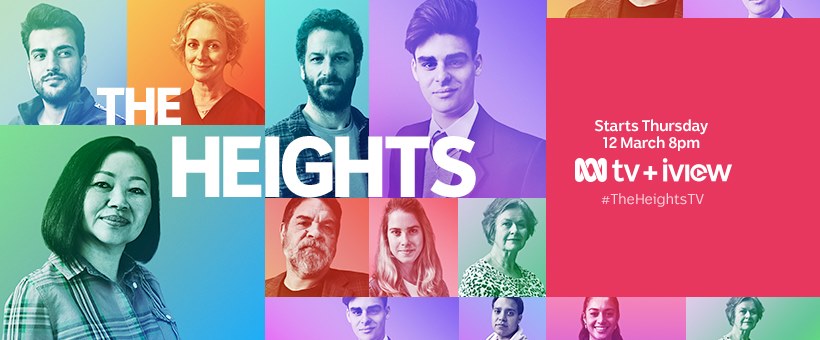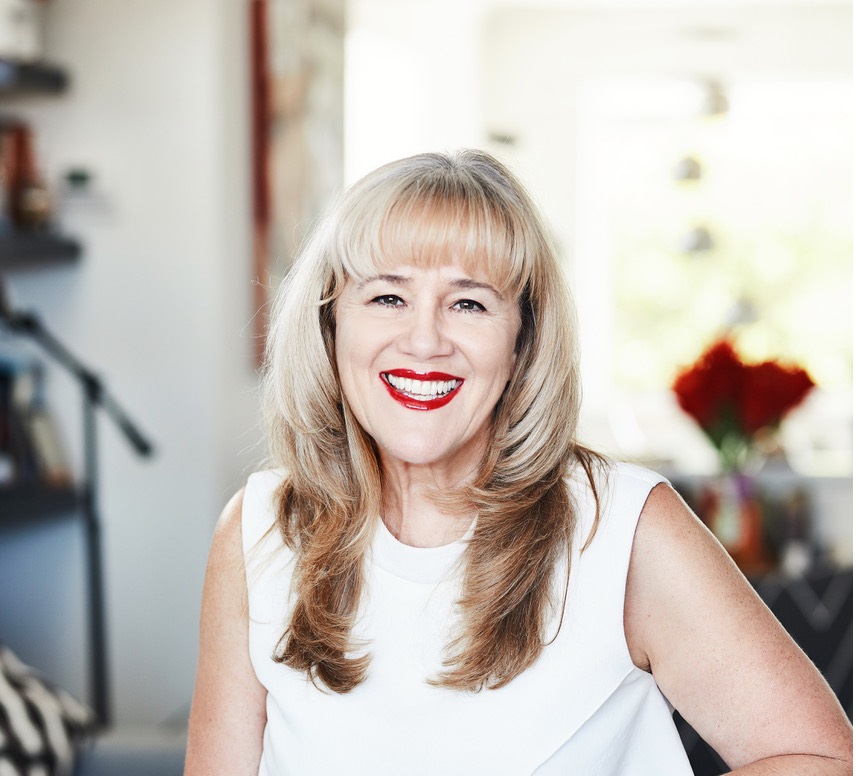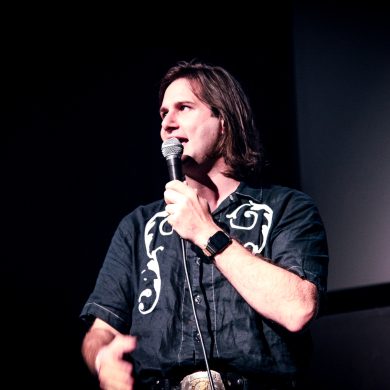This diversity and the grounded nature of The Heights has had people raving about the show on social media. The feedback I’ve seen online has been positively rapturous, with many commenting about the real nature of the show, and as such, a genuine community has been established around the show. Part of me wonders if the way the first half of season one was available to binge in its entirety helped with this. Having watched the first two episodes of season two at a projected screening at Luna Leederville, I was left itching to find out more. The inherent hook of these serial shows leaves you needing to see how the lives of these characters develops.


(As an aside, the show looks absolutely stunning on the big screen, so much so that if the show has the legs it deserves to have, I’d pay good money to see a movie spin-off down the line.)
Annie responds in kind:
It is great, and really affirming, particularly for a production that was shot all in Western Australia. Even though we had some of those actors who were high profile that we brought from interstate, we had over 100 speaking roles on the first series, and of those, we had only five who weren’t West Australian, or who had never been trained or born in Western Australia, so it was huge boon for our industry here, and a recognition of the talent that is here in WA.
It’s funny, I have a daughter in law who lives in London… my eldest son who lives in London, and his wife who is Filipino-Chinese mentioned about an Asian Facebook group in London that was talking about The Heights! And talking about Iris (Carina Hoang) as a parent, and of course, she has such a pragmatic relationship with her son, and she was joking about how much it rang true the whole thing of an Asian child going to their parent saying, ‘mum, can I have a hug?’ and the mother or the father going, ‘what’s wrong? Are you sick? What’s happened?’
That kind of relatability is important and vital to the strength and success of a show like The Heights. But, the key thing is, diversity doesn’t just mean different people on screen, different cultural backgrounds, or sexualities, or genders, or religions. Diversity also extends to landscapes and cities. Australia is not just Sydney and Melbourne, and as such, the difference of Perth is just as important to show on screen.
The personality (or, as we like to say in Perth, the Perthonality) of this humble city is reflected brilliantly in The Heights. It’s not distinctly Perthian, with the show operating in a vague kind of ‘anywhere in Australia’ realm, but the suburbs of Perth looks distinctly different than the suburbs of Sydney or Melbourne. Seeing the Narrows bridge, or the lights of Elizabeth Quay, or Beaufort street, on screen is a surprisingly emotional sight.
This is my city. This is my world. This is Perth.
I know how important it is to have a production like this in WA, but I’m curious to hear Annie’s take on it.
It’s huge. It gives a continuity of employment which is something that so need. We used to have a lot of it when Barron Films (production company behind Ship to Shore) the childrens TV series here, so it was employing people on a regular basis, and they would go from one production to the next and the next, and they were able to make a living here. Whenever it used to be feature films that just a four, five, or six week shooting period, then a lot of our professional crew would obviously work on that, but then they have to go away to be able to make money to pay mortgages and rent. It was really wonderful.
But it also has the other aspect of quite a few people who have to started, or are emerging crew, who started working on The Heights, and now have a production/broadcast credit to their name which will help them go to the next stage. Several of our directors are female, who have been able to get work. It just means that they’re able to ramp up their career prospects as well.
For someone who has been in the industry for decades, Annie has seen changes come and go. I ask her about what has changed, and what needs to change in the casting process.
There’s been a couple of significant changes… when the global financial crisis… not the one we’re having right now, but the last one, happened, following that, I noticed that there were quite a few significant changes, in that any production partner who was investing in a project suddenly became far more concerned that they were actively involved in the different stages of the casting process. Prior to that, often investors, network or overseas buyers of a production would be very happy to be the final stage of production, and push the screentest of whoever the producer, or the director, or myself, who we had identified as who we wanted to cast in it. And they usually would very very rarely exercise their right of veto, and they would want to just see that final screen test of that single actor in that role.
After the global financial crisis, it changed and people suddenly wanted to see options, often two or three shortlisted options for a role, so they could also consider who they think would be best for the production. So that really did make it far more like casting by committee. Which isn’t a bad thing, and I totally understand why someone in their company who is investing millions of dollars in a project that they would want to make sure that their responsible with that money. I sometimes feel that ‘wouldn’t it be nice if I didn’t have to screentest actors so often’ because I know from years ago when I was an actor working professional that it’s one of the parts of the industry that noone likes, noone enjoys that process. It’s a necessary evil almost. But now that because of the people who are going to invest in a production and they want to see them, you’ve got to do them.
Another change is that websites like Casting Networks have made my job and other companies much, much easier. I used to have filing cabinets full of different coloured manila folders, with one for every single actor, with photos, and their cv’s, notes that I’d taken down. And every project, I’d literally pull out hundreds of these, and be showing them to directors and producers when we would have meetings. Nowadays, with things being online, and having the internet, it’s amazing, it’s so much easier, it’s so much quicker, you can communicate so much more easily. Actors can all be on Casting Networks or Showcast. I can do footage now, and can almost upload it instantaneously to my private folder on Casting Networks, and then have it be able to be viewed in minutes by my executive producers, producers, and directors.
Also, it’s enabled (technology) actors to self-record, and self-test for roles from anywhere in the world and send them in. It means that location is not so much of a challenge now, and it allows actors to go up for roles wherever they are, and when they are cast they can go where they need to go for those roles.
I think about the impact of the last global financial crisis, and I worry about the fact that we now have to differentiate which crisis people are talking about. Pie in the sky dreaming has me thinking that a show like The Heights is an ideal future for film and television in Australia. It’s cheap to film in Perth. There’s a wealth of excellent talent and crews who are hungry to work on films and television. And, as The Heights shows, having a diverse and engaging cast of characters helps create compelling viewing experiences. Yes, there is security in name actors in the cast, but the people that fill out those roles help add vibrancy and variance to the stories that can be told. Ideally, I want other productions to look towards Perth as a viable place to make their film or show.
I hear about the barriers being broken down, barriers that technology and the immediacy of being able to send an audition tape off straight away from anywhere have helped remove, and I think, well, why not Perth?
As my extensive discussion with Annie comes to a close, I know it would be remiss of me if I didn’t enquire about her exceptionally talented son, Daniel Monks. Nominated for the Best Male Actor in a Play at the 2018 Helpmann Awards for his performance in The Real and Imagined History of the Elephant Man, as well as being nominated for Best Actor at the 2018 AACTA Awards for his performance in Pulse, Daniel has now shifted his work to London, where he’s found great success and acclaim on stage.
I ask Annie about the mother side of her life, and what it’s like to see Daniel doing so well overseas, getting the accolades he deserves?
It’s amazing! It’s amazing as a mother. It’s amazing to see his acting process, and I still give him advice, and we talk a lot. I was having a discussion with him the night before last, where he had his first day off in about three weeks where he didn’t have rehearsals or anything as he’d been going flat out, and he was presenting an award on one of his days off as well! It was a beautiful honour.
He is living the dream, and that’s what he keeps saying, he feels so blessed and honoured, and it’s almost spooky how things are transpiring. He’s getting roles in the UK, people are coming and seeing him, they saw him doing Teenage Dick, and he got extraordinary reviews and won Best Actor at an award show in London. I often say to him, there are so many actors going to London, and they would be incredibly lucky if they got a small bit role, if they could even get any role in London, or much less the Donmar Warehouse (where Teenage Dick played). But he’s feeling very blessed, but he’s worked very hard, that lovely thing is “the harder I work, the luckier I get”. I am so thrilled for him.
I must say, in the UK, they have a far more open approach to casting actors with disability. I think there are a lot more actors there as well who are able to get the training, so they can get the skill levels to compete on the same level playing field in the acting craft areas. In Australia, we still have a way to go.
I graduated from NIDA, and Daniel, several years ago – without me knowing – had contacted NIDA about applying and auditioned to go there. And they said, I’m sorry we don’t train disabled actors, we don’t train people with disabilities, and he was pretty stunned. He said, why not? And they said, the problem is, there aren’t roles for them, and if we train them, then we’re setting them up to fail if there aren’t the roles there. So, I can understand at that time, their attitude, but certainly now fortunately there’s been a shift in change, but more actors are able to spend the time and money to get the training they need from a diverse background.
The disabled community, as per the Screen Australia study, is the most underrepresented community. It is the subsection that is the least represented on our screens in Australia. That will change, people need to keep trying to do it.
I wrote about Daniel’s struggle with NIDA and being recognised in Australia as seen in the show Perspective Shift. Additionally, I mentioned about my interview with RJ Mitte when Standing Up for Sunny came out, and mentioned how a show like Breaking Bad wasn’t helping open the doors it should have for other actors. It seems to me like Australia and the US have blinkers on when it comes to casting, where they just won’t consider disabled actors for roles.
Annie ‘yes, and’s’ and carries on:
…and also, start thinking broader when reading a role. It doesn’t have to be written as a disabled role for you to consider casting a disabled actor. And that’s one thing that Daniel was very excited about when he was cast as Constantine. The first that he said was, mum, you’re not going to believe this, here I am, gay and disabled, and I’m going to play a romantic heterosexual lead role opposite Emilia Clarke. My thing is, that’s a disability blind casting, which is wonderful. Similarly, it’s what happened when he did Lord of the Flies with the Sydney Theatre Company with Mia Wasikowska, where his character wasn’t written as disabled, and in fact, he wanted to play the diabolical, most extreme bully character, who ends up killing Piggy, because he didn’t want to play the victim. He wanted to break away from any kind of cliche pitied and poor, of being the disabled character who ends up being the one who is bullied and killed. He actually convinced the director to cast him in the almost, baddie role, if you like.
And it’s here, this deep mentality of ‘thinking broader when reading a role’ that I feel is the core mentality of how Annie Murtagh-Monks works.
When casting for a role, Annie is certainly thinking about the best person for the role, but she’s also operating under the knowledge that inclusion and acceptance helps foster a wealth of talent who are routinely overlooked because they’re not what we’ve come to expect on screen. Change is occurring, and it is a gradual process, but with the Annie Murtagh-Monks of the world out there helping fill shows like The Heights with a massively diverse cast of actors, it’s happening just that little bit quicker.
Season two of The Heights kicks off on ABC on March 12th at 8pm. Catch episodes live, or follow up with them on iView.




